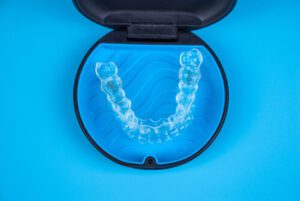When achieving that picture-perfect smile, the options can seem endless. Among the most popular treatments in the world of cosmetic dentistry are Invisalign and veneers. Both promise a straighter, more attractive smile, but they take very different paths to get there. So, how do you decide between them? This detailed guide will discuss every aspect of Invisalign and veneers, highlighting why Invisalign might have the edge. Let’s dive into this orthodontic face-off and help you make an informed decision that fits your smile goals and lifestyle, considering the veneers Invisalign comparison.
What’s the Difference? Understanding Invisalign and Veneers

It is important to note that many of these treatments are best suited for patients who have all their permanent teeth. Young patients who haven’t yet developed all their permanent teeth may not be ideal candidates for procedures like veneers or Invisalign, as complete dental development is crucial for the success of these cosmetic and orthodontic treatments.
Invisalign Treatment: The Clear Path to Straight Teeth
Invisalign is an orthodontic solution that employs a sequence of clear, removable aligners to progressively align your teeth. These invisible aligners are customised for each patient and worn for 20 to 22 hours daily. Over time, they shift teeth into their desired positions, addressing issues like misaligned teeth, bite issues, and crowded teeth. Invisalign involves a personalised treatment plan crafted by a dental professional to ensure your teeth gradually shift into the perfect alignment.
Veneers: The Cosmetic Solution for a Flawless Smile
On the other hand, dental veneers are thin coverings of porcelain or composite resin bonded to the front surface of your teeth. They are primarily cosmetic treatments designed to improve the appearance of your smile. Veneers can also be used to cover eroded teeth. Veneers are often used to conceal discoloured teeth, chipped teeth, or minor misalignments. While they don’t move your teeth like Invisalign, they can create the look of straighter teeth and are a popular choice for those looking to enhance their smile quickly.
Invisalign vs Veneers: A Closer Look at the Advantages of Invisalign
While both treatments have their merits, there are several reasons why Invisalign may be the better option for many people. Here’s why:
Invisalign Preserves Your Natural Teeth
One of the most significant advantages of Invisalign over veneers is that it preserves natural teeth. Invisalign focuses on moving your teeth into the correct position without altering the tooth surface. Veneers, however, often require the removal of a thin layer of enamel to fit properly, which is an irreversible process. This means your natural teeth are permanently altered once you opt for veneers. Invisalign might be the better option if you value keeping your natural teeth intact.
Addressing the Root of the Problem
Invisalign is not just a cosmetic fix; it addresses the underlying dental issues that cause misaligned teeth. By correcting these problems, Invisalign can enhance your oral health by lowering the chances of tooth decay, gum disease, and other dental problems. While excellent for covering imperfections, veneers do not address these underlying issues. They are purely cosmetic treatments and won’t correct problems like bite issues or crooked teeth. If you’re looking for a solution that improves your teeth’ appearance and health, Invisalign is the way to go.
A Natural and Subtle Approach
Invisalign aligners are clear and almost invisible, making them a favourable choice for adults seeking to straighten their teeth discreetly without the noticeable look of traditional metal braces. This subtlety allows you to maintain a natural smile throughout the entire treatment process. While they can provide a stunning transformation, veneers might look less natural if not expertly crafted and applied. Invisalign lets you straighten your teeth discreetly so no one will notice you’re in treatment.
Removability for Easy Maintenance
A major advantage of Invisalign is the removability of the aligners. You can easily take them out when eating, drinking, and brushing your teeth, which helps you maintain excellent oral hygiene during your treatment and reduces the threat of tooth caries and gum disease. In contrast, veneers are permanently attached to your teeth, requiring you to be more cautious with your diet and dental care to prevent any damage.
Long-Term Oral Health Benefits
Invisalign not only straightens your teeth but also has long-term benefits for your oral health. Maintaining and cleaning well-aligned teeth is much easier, which helps prevent dental problems like tooth decay and gum disease. Additionally, by correcting bite issues, Invisalign can prevent future dental issues arising from an improper bite. While they can provide a beautiful smile, veneers do not offer these same long-term health benefits. Moreover, veneers may require replacement over time to maintain their appearance.
When Veneers Might Be the Better Option?
While Invisalign offers many advantages, there are situations where veneers might be the more appropriate choice, especially for cosmetic treatment.
Quick Results for a Flawless Smile

Perfect for Covering Cosmetic Imperfections
Veneers are ideal for addressing cosmetic imperfections such as discoloured teeth, chipped teeth, and minor misalignments that don’t require orthodontic treatment. If your main concern is the look of your teeth rather than their alignment, veneers can provide a flawless finish. Porcelain veneers typically offer a more durable and natural-looking option, although composite veneers are also available for those seeking a more budget-friendly solution.
Versatility in Treating Multiple Issues
Veneers can manage a wide range of cosmetic issues, including discoloured teeth, gaps between teeth, worn-down or eroded teeth, and eroded teeth. They can also cover eroded teeth. This versatility makes them a popular choice for those seeking to refine the overall appearance of their smile. While Invisalign is effective at straightening teeth, it cannot change the colour or shape of your teeth in the way that veneers can.
Invisalign Treatment Process: What to Expect
If you’re leaning towards Invisalign, it’s helpful to understand what the treatment process involves.
Initial Consultation
Your Invisalign journey starts with a consultation with a dental professional. During this appointment, your dentist will examine your teeth and talk about your treatment goals. This consultation is crucial to determine if Invisalign is the appropriate treatment choice for you.
Customised Treatment Plan
If you choose to move forward with Invisalign, your dentist will create a treatment plan customised to your specific needs. This plan outlines the entire treatment process, including the number of aligners needed and the estimated treatment duration. Advanced 3D imaging technology creates a virtual representation of your teeth and how they will gradually move into the right position.
Fabrication of Aligners
Once your treatment plan is final, your aligners will be customised to fit your teeth perfectly. These aligners are made of a smooth, BPA-free plastic that won’t cause irritation your gums or cheeks.
Wearing the Aligners
You’ll need to wear your Invisalign aligners for 20 to 22 hours each day, removing them only for eating, drinking, and maintaining oral hygiene. As your teeth progressively shift into their new positions, you’ll transition to a new set of aligners roughly every two weeks.
Regular Check-Ups
Throughout your treatment, you’ll have regular visits for check-ups with your dentist to keep an eye on your progress and receive your next set of aligners. These visits are typically quick and straightforward.
Completion of Treatment
Once your teeth have moved into their desired positions, your treatment is complete. To preserve your newly aligned smile, your dentist may suggest wearing a retainer to prevent your teeth from returning to their original alignment.
Veneers Treatment Process: A Step-by-Step Guide
If veneers align with your goals, here’s what you can expect during the treatment process.
Initial Consultation
Much like Invisalign, the veneer treatment process starts with a consultation where your dentist will discuss your dental cosmetic goals and determine if veneers are the right choice for you.
Tooth Preparation
If you choose to move forward with veneers, your dentist will prepare your teeth by removing a small layer of enamel from the front surface. This step is crucial to make sure the veneers fit correctly and appear natural. While the amount of enamel removed is minimal, it is an irreversible process.
Impressions and Fabrication
After your teeth are prepared, your dentist will take impressions that will be used to create your custom veneers. In the interim, you may receive temporary veneers to protect your teeth.
Veneer Placement
Once your permanent veneers are ready, they will be bonded to your teeth using a specific adhesive material. Your dentist will make any necessary adjustments to guarantee a perfect fit and the desired look. The bonding process is vital for making sure the veneers appear natural and blend seamlessly with your existing teeth.
Final Results
With adequate care, your veneers can last for many years, providing a beautiful, long-lasting smile. Regular dental check-ups and good oral hygiene are critical to maintaining the health of your teeth and the longevity of your veneers.
Maintenance and Aftercare: Keeping Your Smile Beautiful
No matter which treatment you choose, maintaining your smile requires proper care and regular dental check-ups.
Invisalign Aftercare
After completing your Invisalign treatment, you’ll likely need to wear a retainer to keep your teeth in their new positions. Without a retainer, your teeth may gradually return to their original alignment. It’s equally important to maintain proper oral hygiene by brushing and flossing routinely to prevent tooth caries and gum disease.
Veneers Aftercare
Veneers require diligent care to ensure they last as long as possible. While porcelain veneers are durable, they can still be damaged by biting into hard objects or grinding your teeth. Maintaining good oral hygiene is also critical to avoid decay around the edges of the veneers. Regular dental check-ups will help make sure your veneers remain in excellent condition and that your teeth and gums stay healthy.
Making the Right Choice: Invisalign or Veneers?
Choosing between Invisalign and veneers ultimately comes down to your needs and goals. If you want to correct misaligned teeth and improve your oral health, Invisalign is the clear choice. It offers a discreet, effective way to straighten your teeth while preserving your natural tooth structure.
On the other hand, if your primary concern is the appearance of your teeth and you’re looking for a quick fix, veneers might be the better option. Veneers can dramatically refine the look of your smile by covering up imperfections like discoloured teeth, chipped teeth, and minor misalignments.
FAQs About Veneers vs Invisalign
- Can Invisalign fix severe dental misalignments or only minor issues?
Invisalign is highly effective in addressing a broad spectrum of dental misalignments, from minor crooked teeth to more complex bite issues. However, in cases of severe misalignment, your dentist may recommend a combination of treatments or even traditional braces.
- How long do veneers last, and will I need to replace them?
Porcelain veneers generally endure 10 to 15 years with good care, while composite veneers may last around 5 to 7 years. Over time, veneers may require replacement due to wear and tear, so preserving good oral hygiene and avoiding teeth-grinding habits can help extend their lifespan.
- Can I eat and drink anything I want while wearing Invisalign aligners?
One of the perks of Invisalign is that you can take out the aligners while eating or drinking, enabling you to enjoy all your favourite foods without any restrictions. Simply remember to clean your teeth and aligners before reinserting them back in to maintain proper oral hygiene.
- Are there any risks associated with getting veneers?
While veneers are generally safe, some risks exist, such as tooth sensitivity due to enamel removal and potential damage to the veneers if proper care isn’t taken. It’s important to discuss these risks with your dentist before proceeding with treatment.
- How do I decide between Invisalign and veneers for my smile goals?
The choice between Invisalign and veneers depends on your specific dental needs and cosmetic goals. Invisalign may be the better choice if you’re looking to correct misalignment and improve oral health. If you want to enhance the appearance of your teeth quickly and cover cosmetic imperfections, veneers might be more suitable. Consult with your dentist to determine the best treatment option for you.
- Are veneers suitable for patients who do not yet have all their permanent teeth?
Veneers are generally not recommended for young patients who have not yet developed all their permanent teeth. It is important to wait until dental development is complete to ensure the best results and avoid complications.
Final Thoughts: Your Smile, Your Choice

Remember, your smile is one of your most valuable assets. Take the time to explore your options and invest in a treatment that not only enhances your appearance but also supports your overall oral health. With proper care and the right treatment, you can have a beautiful, healthy smile for years to come.
In summary, while both Invisalign and veneers offer significant benefits, Invisalign often stands out as the more comprehensive solution for those aiming to improve both the function and look of their teeth. By preserving natural tooth structure, addressing underlying dental issues, and promoting long-term oral health, Invisalign provides a clear path to achieving a straighter, healthier smile.
If you’re thinking about Invisalign and would like to explore your options further, reach out to Balmoral Dental Centre at (07) 3113 9789 to book a consultation and start your journey toward achieving your ideal smile.
References:
Healthline. (n.d.). Does Invisalign work?. https://www.healthline.com/health/does-invisalign-work
Cleveland Clinic. (n.d.). Dental veneers. https://my.clevelandclinic.org/health/treatments/23522-dental-veneers
ResearchGate. (n.d.). Normal tooth structure (right-hand labels) exhibits a thin, highly mineralized enamel. https://www.researchgate.net/figure/Normal-tooth-structure-right-hand-labels-exhibits-a-thin-highly-mineralized-enamel_fig7_268566312
Mayo Clinic. (n.d.). Cavities: Symptoms and causes. https://www.mayoclinic.org/diseases-conditions/cavities/symptoms-causes/syc-20352892
UIC College of Dentistry. (n.d.). Tips for good oral hygiene and healthy smiles. https://dentistry.uic.edu/news-stories/tips-for-good-oral-hygiene-and-healthy-smiles/

